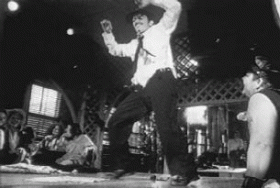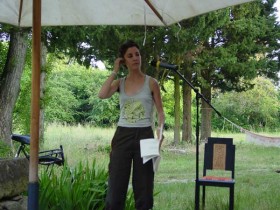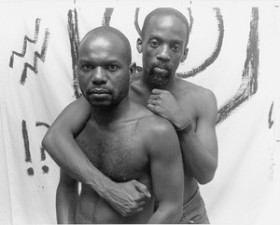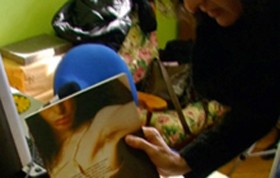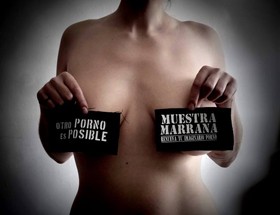 – unlimited resources at the 2012 Women’s Film Festival
– unlimited resources at the 2012 Women’s Film Festival
This year, from 17 to 22 April, the Dortmund | Cologne International Women’s Film Festival extends an invitation to Cologne, with the aim once again of drawing public attention to women’s film creativity for six whole days. Cineastes can already look forward to an outstanding programme of international films, a true potpourri of visually stunning movies, committed documentaries, short films and experimentals. Having viewed in excess of 800 works made by women film directors from all over the world, the festival team is pleased to present a choice selection of around 100 current films in the usual range of sections: the International Debut Fiction Feature Film Competition (prize money of ?10,000); the National Competition for Women Directors of Photography (prize money of ?5,000); Country Focus – What’s Going On? the Arab world; Panorama; desired! film lust & queer and a Polish film platform. Also, as usual, the films on offer in Cologne are supplemented by professional development courses, a film workshop for girls and several specials as well as concerts, discussions and guest talks.
International Debut Fiction Feature Film Competition: Films from eight countries compete for prize money worth ?10,000
In Cologne this year, from 17 to 22 April, eight highly talented women will guest at the International Debut Fiction Feature Film Competition, the aim being to show their first feature-length film for the chance to win prize money of ?10,000. The overall purpose of the competition is to encourage women film directors to continue making films. And the good news is: interest is growing all the time. With over 150 recent debut feature films from no fewer than 50 countries, the preselection list was longer than ever. And though this may sound a bit banal, it’s true nevertheless: the films on the list are as different as they are numerous and it is not possible to speak of distinct trends as such. That said, the women film directors introduce us to any number of female protagonists who are at odds with themselves and with life in general. The films deal with sexuality and self-determination, loneliness and alienation as well as daring ventures and new departures. This year’s shortlisted films come from Austria, Brazil, Canada, France, Georgia, Morocco, Turkey and the USA. Three films are receiving their German premiere and several of the directors will be on hand in Cologne to present their work in person.
Among the films competing in this section are: 17 FILLES (Muriel und Delphine Coulin, F 2011, 90′), ZEPHYR (Belma Baş, TRK 2010, 93′, German Premiere), HISTÓRIAS QUE SÓ EXISTEM QUANDO LEMBRADAS (Julia Murat, BRA 2011, 98′, German Premiere), NUIT #1 (Anne Émond, CDN 2011, 91′), SALT WHITE (Keti Machavariani, Georgia 2011, 80′), SPAIN (Anja Salomonowitz, A 2012, 102′), RETURN (Liza Johnson, US 2011, 97′, German Premiere) and SUR LA PLANCHE (Leila Kilani, MAR/F/GER 2011, 106′).
The Jury deciding on the actual award consists this year of actress Julia Jentsch from Germany, film-director and writer Xiaolu Guo from China, and journalist and curator Lucy Virgen from Mexico.
What’s going on? Country Focus: the Arab World
The Country Focus section at the film festival acts as a showcase for the cinematic oeuvre of women directors working in a given region. A year after the Arab Spring, the festival is pleased to organise an encounter with women film-makers based in North Africa and the Middle East whose films were made before the actual uprisings. The women’s multi-layered and imaginative analyses of their societies from within offer an intriguing look at areas of conflict and levels of contradiction in the Arab world. What stories do the Arab film-makers have to tell and what are the female characters like?
We will therefore attempt via film and discussion to submit the image of the Arab world and Arab women to a kind of revision. Not that uprisings are exactly a new topic in Arab film repertories. On the contrary, public film production in the Arab republics often has its roots in revolutionary cinema. Re-appropriating one’s own history, leading a self-determined life and aiming to gain sovereignty over imagery .these have always been central aspects of the anti-colonialist struggle. In this sense, film has frequently been deployed as a weapon against subjection to an external power. The Algerian FLN and the Palestinian PLO even ran film units that operated within the broad framework of armed resistance. On the other hand, plans to establish an independent film industry ultimately failed. When it comes to art movies, the various Arab countries are now reliant on coproductions with European companies. Choice of films: FORBIDDEN (Amal Ramsis, EG/E 2011, 67′), MAROCK (Laila Marrakchi, MA/F 2005, 96′), WHAT’S GOING ON? (Jocelyne Saab, LB/F 2010, 78′), SALATA BALADI (Nadia Kamel, EG 2007, 104′), PERFORATED MEMORY (Sandra Madi, Pal/JOR 2008, 62′), I LOVED SO MUCH (Dalila Ennadre, MA/F 2008, 50′) and LES SILENCES DU PALAIS (Moufida Tlatli, TUN 1994, 127′)
Panorama – the whole world of film
The Panorama section is more or less the festival’s treasure chest. It showcases the latest films where the visual language allows for a narrative level of its own. There is also room for artistic experiment. Yet whatever the diversity of topic and format, the films (and, above all, the fiction features) are given over to women characters. Large-scale crises are reflected in smaller private dilemmas and calamities. The US indie THE OFF HOURS (US 2011, 93′), directed by Megan Griffiths, is a road movie in reverse that zooms in on the people who stay and not necessarily on the people passing through. More gentle perhaps, but no less rigorous for that, is THE UFO IN HER EYES (GER 2010, 110′), the latest feature-length film from Xiaolu Guo, one of this year’s jury members, who pulls off a successful political satire with a multi-layered portrait of Chinese society. Melissa Leo turns in a superb performance in the title role of FRANCINE (Melanie Shatzky and Brian M. Cassidy US/CND 2012, 74′). Recently released from prison, Francine tries to find a foothold in society again but soon discovers that she gets on better with animals than she does with humans.
The documentary films in Panorama literally span the globe – from Germany through Europe to the remotest corners of the earth. Cologne-based film-maker Britta Wandaogo, for example, video-recorded her brother Dirk for years: NICHTS FÜR DIE EWIGKEIT (aka “Believe in Miracles”; GER 2011, 81′) is the story, with all its highs and lows, of the sisterly love which drug addiction subjects to the hardest of tests. In THE NYMPHS OF HINDU KUSH (GR 2011, 80′), Anneta Papathanasiou leads us to the more or less unknown land of the Kalasha where a small population caught between a Muslim majority and the constraints of modernity attempt to preserve their ancient culture and religion. In her documentary EL LUGAR MÁS PEQUENO (“The Tiniest Place”; MEX 2011, 104′), film director and photographer Tatiana Huezo Sánchez returns to Cinquera, her grandmother’s village in El Salvador. Although still scarred by the memory of guerrillas and military regimes, it is a place full of a zest for life and an urge to rebuild. And yes, globalisation gets it claws into small entities too. ENTRE NOS MAINS (“Into Our Own Hands”; F 2010, 88′) as directed by Mariana Otero is an object lesson about solidarity and labour conflict in a medium-sized underwear factory in France.
desired! – film lust & queer
None of the films selected for the desired! section this year would have been conceivable without a good portion of humour and self-irony and/or a wink of the eye. After all, the idea is to continuously find new weapons in the fight against sexism, racism and homophobia, and humour can always be part of that armoury. Either way, plenty of food for thought and, above all, an invitation to come and feed your curiosity. Set among Hong Kong’s middle classes, Ann Hui’s feature ALL ABOUT LOVE (Hong Kong 2010, 105`) humorously deconstructs the notions of maternity and sexuality. With MOOMY IS COMING (GER 2012, 67′), Cheryl Dunye succeeds in creating a film experiment somewhere between screwball comedy and pornography against the backdrop of Berlin’s raunchy nightlife. CODEPENDENT LESBIAN SPACE ALIEN SEEKS SAME (Madeleine Olnek, US 2011, 76′) – that’s the title of this sci-fi comedy – is also the storyline. Extraterrestrials are dispatched to Planet Earth to find a cure for their sex addiction but are condemned to failure. Meanwhile, the documentary films in the section tell of the struggle for self-determination and independence. In ORCHIDS – MY INTERSEX ADVENTURE (AUS 2010, 60′), for example, film-director Phoebe Hart aims to reconcile herself to her intersexuality and embarks on a filmic journey. Magda Wystub’s YES, WE ARE (PL 2011, 69′) is the first film to take as its focus the situation of emancipatory thinking lesbians and queer women in Poland. Finally, two short film programmes and a talk by guest speaker Antke Engel, founder of the Institute for Queer Theory, rounds off this section.
Films from Poland
The Dortmund | Cologne International Women’s Film Festival has taken the cultural exchange programme Klopsztanga. Polen grenzenlos NRW (“Klopsztanga. Poland Without Borders NRW”) as a welcome opportunity to provide a platform for Polish women film directors whose works are as rich and various as the film scene in their country. They can be seen across the various sections of this year’s festival. For instance, the school film programme includes SUICIDE ROOM (Jan Komasa, PL 2010, 110′), a cyber thriller, while Panorama includes the latest feature from film director Urszula Antoniak. Her CODE BLUE (NL/PL 2011, 90′) is a provocative, visceral drama centred on an unusual woman figure. Also on view are a number of documentary films such as the portrait of the controversial artist couple KWIEKULIK (Joanna Turowisz u. Anna Zakrzeewska, PL 2011, 48′) or DECRESCENDO (Marta Minorowicz, PL 2011, 23′), a moving study of an old people’s home as a place full of the joys of life, which was made by the award-winning film director Marta Minorowicz.
Women Film Festivals guesting in Cologne
Happy Birthday Women Make Movies!
To mark the occasion of their 40th birthday, we have invited Women Make Movies – one of the most successful film distributors in the USA – to come to Cologne and present their own programme. The films have been selected to give us an feminist view of racial discrimination: Julie Dash’s classic Illusions (1982) which shows the Hollywood of the Second World War from the perspective of black women; Tracey Moffatt’s experimental NIGHT CRIES – A RURAL TRAGEDY (1990); Ngozi Onwurah’s mother & daughter story in THE BODY BEAUTIFUL (1991); and Natalia Almada’s documentary ALL WATER HAS A PERFECT MEMORY (2001).
Birds Eye View in Cologne
As a result of the sudden abolition of the UK Film Council, Rachel Millward at her team at the renowned Birds Eye View women’s film festival were left more or less unfunded – meaning that their festival scheduled for 2012 cannot take place. So, without further ado, we decided to invite the BEV to Cologne where they will introduce themselves via the critically acclaimed feature film: WE NEED TO TALK ABOUT KEVIN (GB 2011, 110′). Tilda Swinton shines as the mother of a son who has carried out a high school massacre. Casting the film as a psychological thriller, Lyne Ramsay shows the radical inner views of a woman who has lost everything but who needs to go on living.
Women’s Film Festivals in dialogue
Women’s Film Festival: a ghetto or a necessity? We invite you to come and take part in a review of the current international Women’s Film Festivals as we introduce a few organisations with anything between one and forty years of experience. Following that, we will be discussing the general situation with (women) festival organisers, film-makers and viewers. The dialogue will be in English.
In concert: Martina Eisenreich Quartet
For the seventh time now, the Dortmund|Cologne International Women’s Film Festival and the film-dienst magazine have jointly released a CD of film music. The latest disc features the works of composer and violinist Martina Eisenreich who has composed for film, TV, radio, theatre and the concert hall. She first achieved fame with her compositions for the films NIMMERMEER (aka “Nevermore”) byToke C. Hebbeln and MILAN by Michaela Kezele. To mark the release of the CD entitled “Filmmusik – Komponiert in Deutschland: Martina Eisenreich”, the festival is pleased to announce a live performance by the he Martina Eisenreich Quartet at the KunstSalon. Her music is so infectious, emotional and virtuoso that it has a profound and immediate effect on the listeners – rather like experiencing a film through the ears!
For more information, as well as the accreditation form, please visit our website: www.frauenfilmfestival.eu
You also find us on Facebook: www.facebook.com/IFFF.Dortmund.Koeln
